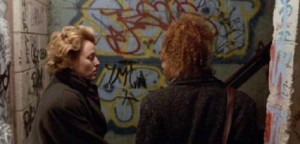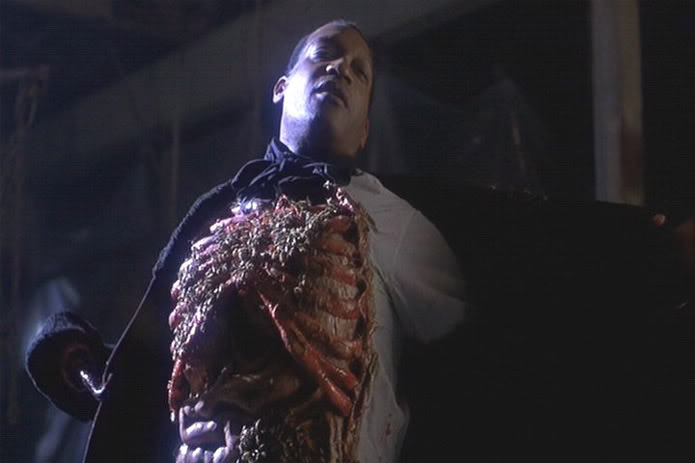Slasher films have come and gone over the years. John Carpenter’s “Halloween” and Sean S. Cunningham’s “Friday the 13th“ brought this sub-genre of horror to the mainstream audiences in the late ’70s and early ’80s, and provided a whole new level of terror. Unfortunately, this was short lived as the 1980s was jam-packed with films trying to cash in on the massive success of these first two. The slasher films eventually died down, and while there was a resurgence with 1996’s “Scream,” another film released a few years earlier offered something a little different: 1992’s “Candyman.”
Based on the short story “The Forbidden“ by Clive Barker, “Candyman” tells the story of a young woman, Helen Lyle, pursuing her graduate thesis on urban legends when she learns stories of the Candyman in Chicago’s Cabrini-Green public housing development. Initially she doesn’t believe in the Candyman; however, events start to unfold that cause her to question his authenticity — as well as her sanity.
Candyman’s origin doesn’t add anything new to the urban legend mythology, but combines themes from several other legends, such as saying his name in the mirror to make him appear. He’s not a serial killer or a monster, and his origin in the film makes him out to be a sympathetic character, which makes his actions all the more puzzling. But perhaps that is giving the film too much credit to think that far ahead.

Probably the most disappointing part about “Candyman” is that it’s just not scary. While there is plenty of blood, gore and disturbing imagery, it fails to create fear for the audience. The scariest part about the film is the several scenes with hundreds of bees on the screen buzzing around. That was more terrifying than the actual deaths themselves. The fact that the bees played a role in Candyman’s existence is a missed opportunity for the filmmakers to do something different and potentially more horrifying than just killing people.
If anything, the strength of “Candyman” lies in its actors to make the performance compelling. Virginia Madsen as Helen Lyle portrays a strong, intelligent woman whose life isn’t ruled by fear. Despite the fact that she could easily get caught up in the urban legends she’s researching, she travels to Cabrini-Green, one of Chicago’s worst gang areas, to investigate a lead on a potential Candyman-related killing. Even as Helen is pulled into the legend further and her reality starts to tear away from her, Madsen still clings to what she can in order to prove her innocence and her sanity. Xander Berkeley gives a good performance as Trevor Lyle, Helen’s husband and a professor at the university where she’s studying. His calm demeanor and constant reassurance of Helen’s theories and experiences help as her research takes her down the rabbit hole.
 Tony Todd as the titular character is probably the most disappointing performance of them all. While Todd is a decent actor and his voice certainly works to his advantage for the scare factor, there isn’t much material here for him to work with. To be fair, there isn’t much for the character to do other than killing people, but perhaps showing him in flashbacks to how he became the Candyman would have worked in the story and character’s best interests. While it is nice to have a non-masked killer in a slasher film, perhaps putting the character in a mask and using Todd’s voice would have had a more terrifying effect. Vanessa Williams (not that Vanessa Williams), Kasi Lemmons, Gilbert Lewis, and DeJuan Guy round out the rest of the cast and are rather unexceptional in their roles.
Tony Todd as the titular character is probably the most disappointing performance of them all. While Todd is a decent actor and his voice certainly works to his advantage for the scare factor, there isn’t much material here for him to work with. To be fair, there isn’t much for the character to do other than killing people, but perhaps showing him in flashbacks to how he became the Candyman would have worked in the story and character’s best interests. While it is nice to have a non-masked killer in a slasher film, perhaps putting the character in a mask and using Todd’s voice would have had a more terrifying effect. Vanessa Williams (not that Vanessa Williams), Kasi Lemmons, Gilbert Lewis, and DeJuan Guy round out the rest of the cast and are rather unexceptional in their roles.
Despite Cunningham’s attempts to do something different with the slasher film, “Candyman” fails to frighten us in a way where we need to keep the lights on at night, double check the locks on the doors, and race into bed. While the story has some good ideas, the execution and selection of villain ultimately make this film a mediocre entry in the horror genre.
by – Mike Surerus


